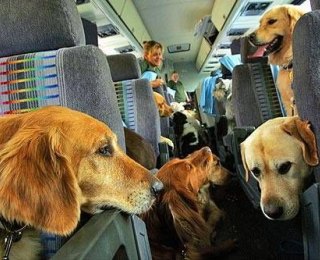
But a committee of airline representatives and disabled rights advocates has been meeting for months in Washington, D.C., to come up with new rules on what type of animals should be permitted on planes and what documents are required to prove the animals are needed.
Airlines recognize two types of animals that can accompany passengers free of charge: service animals, such as seeing-eye dogs, and emotional support animals, which help comfort travelers with psychological or emotional conditions.
The debate among members of the Accessible Air Transportation advisory committee focuses on what type of animals can be recognized as emotional support animals.
The National Multiple Sclerosis Society, among others, suggests limiting emotional support animals to dogs, cats and rabbits, while other organizations, including the Autistic Self Advocacy Network, would like to add birds to that list (but not chickens, ducks or turkeys).
Some advocacy groups say passengers shouldn’t be required to carry a letter from a mental health professional confirming the need for an animal because it would be stigmatizing.
Airline representatives say too many passengers falsely claim that their pets are emotional support animals. The carriers want to recognize only dogs and miniature horses as service animals and require that all animals be kept in pet carriers during the flight.
The Asthma and Allergy Foundation wants to limit the type of animals allowed on a plane for a different reason.
“Allowing various types of animals to fly will expose all passengers to pet dander, even when the animal is riding in an enclosed carrier,” the group wrote to members of the committee.
